17 Best Test Data Management Tools [2024]
Piyusha
Posted On: April 9, 2024
![]() 188306 Views
188306 Views
![]() 36 Min Read
36 Min Read
In the software development and testing process, accuracy and effectiveness are crucial. Organizations aim to provide top-notch software solutions, making handling test data a vital part of the testing procedure. In today’s digital advancement, where data is the driving force behind innovation and business success, the significance of efficient test data management cannot be emphasized enough.
Effective testing relies heavily on test data management, an often overlooked aspect. Testers require high-quality, secure test data to ensure software quality. Despite many resources discussing test data management tools, a comprehensive comparison of top contenders is rare.
In this blog, we will learn some of the best test data management tools and their unique features to help testers make informed decisions and enhance their testing experience.
TABLE OF CONTENTS
What is Test Data Management?
Test Data Management (TDM) is the practice of creating and managing the data used for software testing. It involves systematically handling data sets used in testing processes.
The main aim of TDM is to mimic real-world scenarios in testing environments. Detecting system flaws, finding vulnerabilities, and validating software functionality. It ensures testing teams have authentic data while protecting sensitive information by balancing data realism and privacy.
By adopting test data management practices, organizations can systematically organize and prepare test data to align with specific testing objectives and cover various use cases. This enables testing teams to conduct comprehensive testing processes, including user acceptance, security, performance, and functional testing. Test data management is crucial for developing reliable, high-quality software, as it assesses functionality, scalability, and stability.
Why is Test Data Management Important?
In software testing, test data management is crucial due to several factors that directly influence the testing process’s effectiveness, accuracy, and reliability. Here are some key points highlighting the importance of test data management:
- Realistic Testing Conditions: It ensures the availability of multiple and realistic datasets. Testing teams can now assess software performance in settings resembling real-world usage.
- Effective Procedures for Testing: It makes testing more efficient by organizing data into subsets and providing only relevant portions. This accelerates the testing process, reduces resource needs, and makes testing more cost-effective and efficient.
- Faster Time-to-Market: It accelerates testing cycles by providing prompt access to relevant test data. This helps expedite product releases by ensuring that all testing phases—from development to quality assurance—are carried out effectively.
- Data Integrity and Quality: It evaluates the dataset’s content and structure. This improves data quality and consistency in testing scenarios by aiding in identifying defects or anomalies.
- Optimal Use of Resources: It optimizes resource usage using data subsetting and archiving techniques. This approach reduces storage costs and enhances overall resource efficiency by utilizing only relevant portions of the dataset.
- Validation of User Experience: It ensures that the testing environment includes user-specific scenarios. Testing in environments resembling real-world user interactions helps organizations validate and enhance user experiences.
- Risk Mitigation: It ensures the accuracy of testing scenarios by mitigating data security risks through techniques like data masking and synthetic data generation. This proactive approach helps identify and resolve safety concerns before deployment.
- Compliance and Data Privacy: It uses techniques such as data masking to ensure that sensitive information is obscured or anonymized during testing. This conforms with data protection regulations and facilitates comprehensive testing.
Test data management is critical in ensuring a reliable testing environment that simulates real-world scenarios, addresses privacy concerns, optimizes resource usage, and ensures software applications’ overall reliability and standard. By managing test data effectively, organizations can improve their testing processes and deliver software that meets user and business requirements.
Test Data Management Tools
The success of software development relies on two key things: ensuring the application works as expected and keeping the data safe. Balancing these can be tough. Testing is crucial, but it should never put sensitive data at risk. That’s where data management tools come in. They help solve this problem by enabling thorough testing while keeping sensitive data safe. These tools make it easier to create, manage, and use test data, improving testing processes significantly.
From data masking and subsetting to synthetic data generation and advanced profiling, these tools represent innovation, addressing complexities and ensuring that testing environments mirror real-world scenarios.
Let’s learn the different test data management tools, their features, and the applications that give organizations the background information they need to make informed decisions as they seek software perfection.
LambdaTest
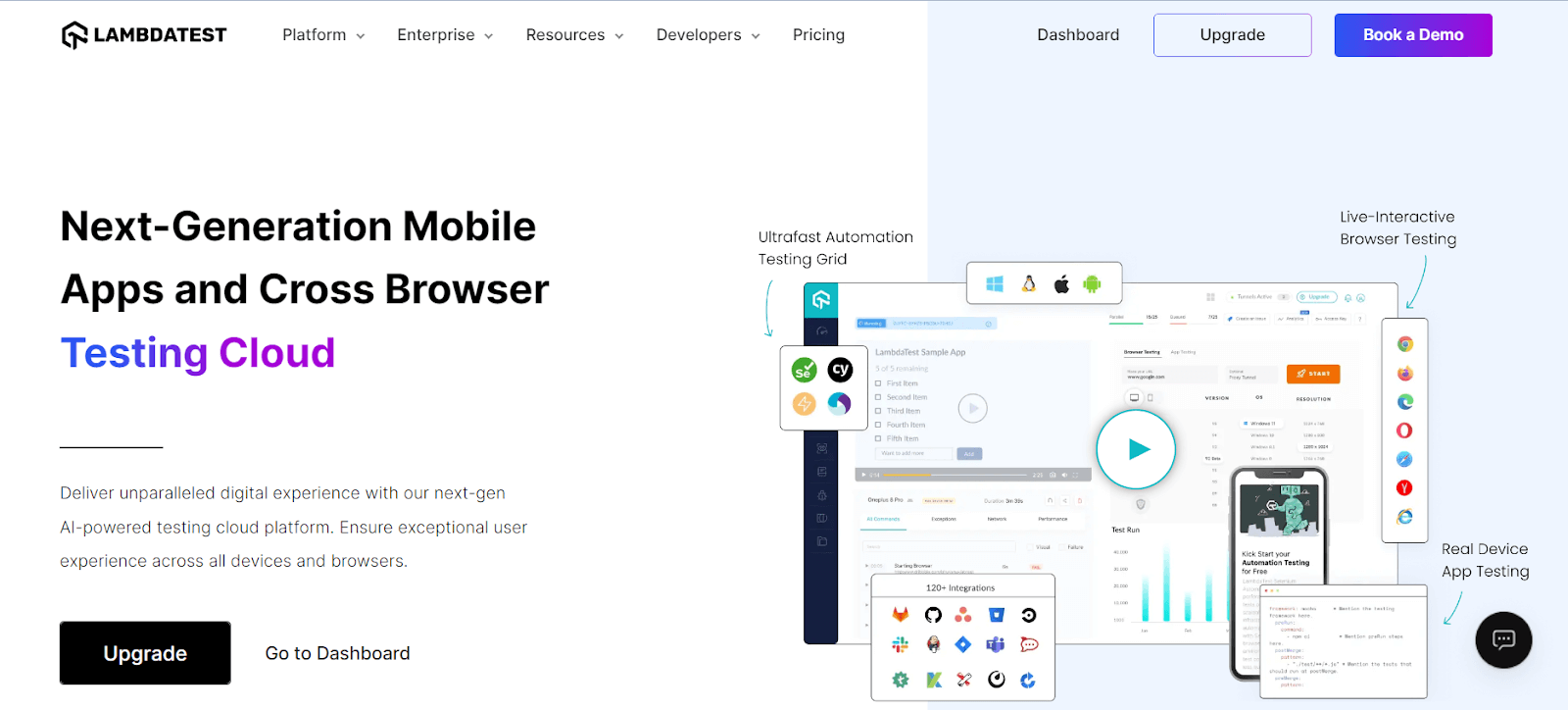
LambdaTest is an AI-powered test orchestration and execution platform to run manual and automated tests at scale with over 3000+ real devices, browsers, and OS combinations.
It provides a robust test data management solution that helps developers and testers effectively manage test data. It helps streamline test data authoring, management, triggering, and reporting through a unified Test Data Manager, enhancing efficiency across all testing stages. The platform offers a comprehensive overview of testing progress and outcomes, enabling users to track, manage, and accelerate the software release cycle with ease.
Key features of the LambdaTest test data management tool include.
- Effortless Test Case Creation and Management: LambdaTest’s Test Manager allows you to easily create and manage test cases using intuitive hotkeys. You can add detailed steps, actions, and specifics for a customized workflow.
- Generative AI for Test Step Process Improvement: It improves your test step process with Generative AI. Automatically generate the next step by leveraging existing test steps and test cases.
- Seamless Test Case Import: It seamlessly imports your existing test cases using API or CSVs with an automated mapping technique. Ensure that all fields and values are mapped effortlessly.
- Advanced Search and Filtering: It views your created test cases through advanced search and filtering capabilities and helps you quickly identify and access the necessary test cases, boosting and optimizing testing efficiency.
- Efficient Test Plan Building: It efficiently builds targeted test plans by selecting test cases, assigning configurations, and assignees. Broaden your testing with multiple configurations per case and monitor performance with a detailed build history.
- Comprehensive Build History: It helps track test plan performance and manage test outcomes with a comprehensive build history. Assign pass, fail, or skip statuses to test cases and attach evidence directly. View overall test case results across desktop and mobile.
- Live Test Step Viewing and Manual Test Duration Tracking: It allows live viewing of test steps and tracking manual test durations for optimal efficiency. Enhance your testing with automatic evidence creation and the ability to attach screenshots and videos on the go.
Watch a detailed video tutorial to learn more about Unifed Test manager tool and get started with the platform.
Subscribe to the LambdaTest YouTube Channel for more video tutorials on various automation testing techniques and frameworks such as Selenium, Cypress and Playwright. You can also leverage LambdaTest to integrate with various CI/CD tools and other project management tools.
DATPROF
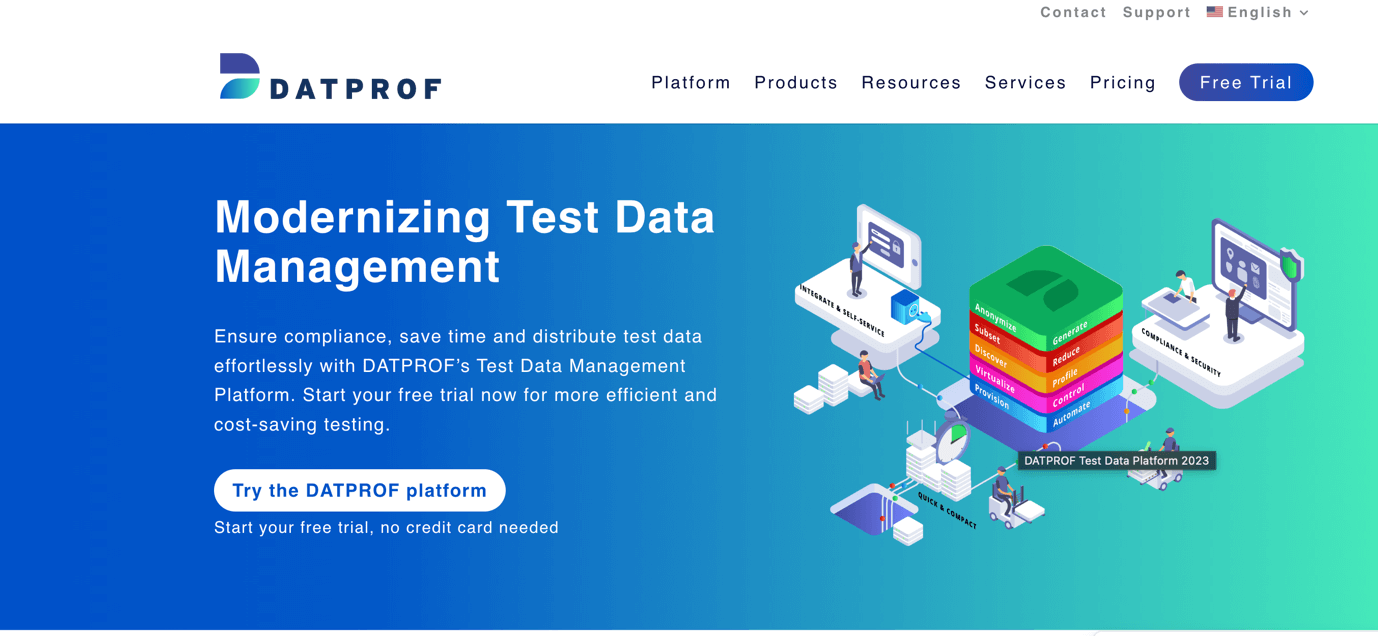
DATPROF is a leading test data management tool developed by a team of seasoned software testing professionals and data management experts. It represents the culmination of years of research and innovation in test data management. With its robust architecture and cutting-edge capabilities, DATPROF has quickly gained recognition as one of the top TDM solutions on the market. It is trusted by organizations across diverse industries to navigate the intricate challenges of testing complex applications and systems.
Key features of the DATPROF test data management tool are mentioned below.
- Accelerated Development Cycles: It streamlines the data generation and profiling processes, contributing to faster software development cycles and enabling organizations to release high-quality software solutions more quickly.
- Data Versioning and Lineage: It is essential to comprehend data versioning and lineage for effective data management. It offers features that track changes, making it easier for teams to manage and trace data throughout its lifecycle.
- Enhanced Test Coverage: It assists organizations in accomplishing complete test coverage by discovering potential issues before they reach production. This is achieved by developing realistic and diverse test scenarios through data subsetting and masking.
- Data Profiling and Discovery: It excels at data profiling and discovery, providing organizations with in-depth knowledge of their data. The tool helps users identify anomalies, discrepancies, and other potential issues by analyzing the data’s structure, content, and quality.
- Data Masking and Subsetting: It offers robust data masking and subsetting features, which are essential for protecting sensitive information, and it ensures that sensitive data can be created in a realistic test scenario while adhering to privacy regulations and compliance standards.
- Application Testing: It plays a key role in creating realistic test environments facilitating thorough application evaluation across various scenarios.
- Database Migration: It makes the process of migrating databases easier by assisting in creating realistic test data that simulate the production environment.
- Regulatory Compliance Testing: It benefits organizations in heavily regulated industries by ensuring compliance. DATPROF’s ability to create test environments that adhere to data privacy and security regulations is invaluable.
K2View
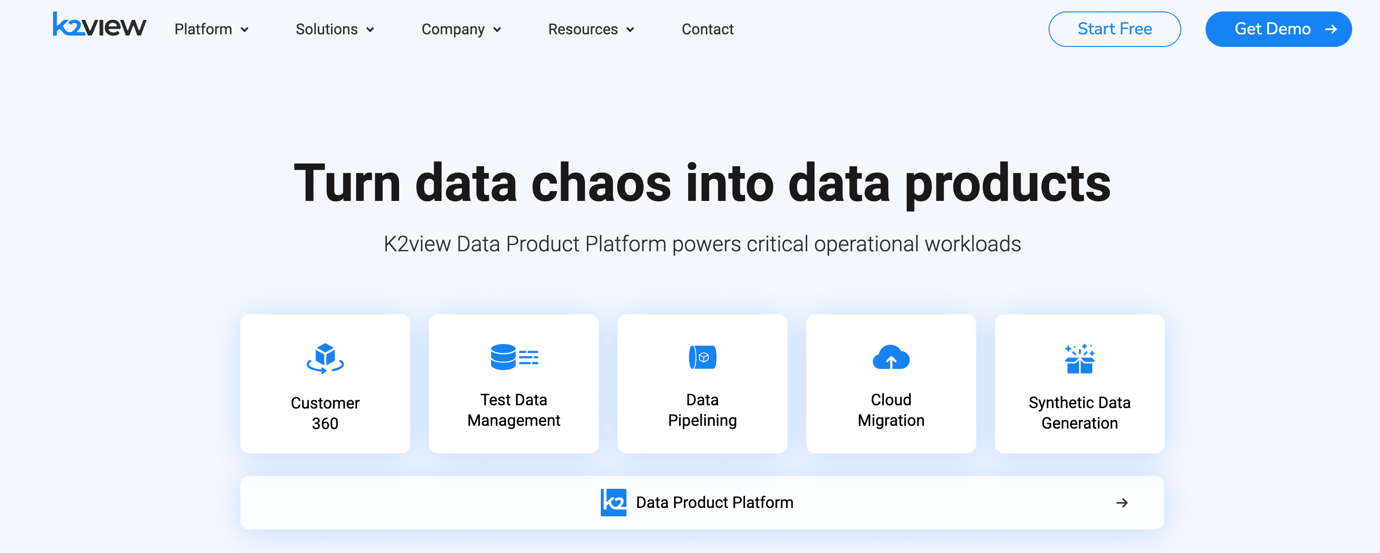
K2View is the test data management tool for enterprises operating in complex environments. It enables testers to quickly provision test data subsets on demand from various production sources, ensuring referential integrity is preserved. The software offers extensive API-enabled integration into DevOps CI/CD automation pipelines.
It excels in discovering and masking sensitive data (PII) at rest or in transit. Additionally, it provides features such as synthetic test data generation, versioning, subset reservations, reporting, an authentication layer, and more.
K2View is the first to utilize a comprehensive data fabric that transforms how businesses access, integrate, and extract value from their data. Its integrated and standardized data fabric is the organization’s single source of truth, and it effortlessly merges various data sources, types, and structures. It enables organizations to make well-informed decisions, increase operational efficiencies, and gain a competitive edge in their respective industries by deconstructing data silos and enabling seamless collaboration across departments and applications.
Key features of the K2View test data management tool include.
- Real-time Data Orchestration: It dynamically manages and syncs data across several platforms, enhancing agility and responsiveness to shifting business requirements.
- Scalable Data Processing: It effectively manages massive data volumes, maintaining peak performance even with expanding datasets and intricate processing needs.
- Agile Data Modelling: It enables organizations to swiftly respond to business needs by offering agile data modeling features. This simplifies the creation and editing of data models, promoting flexibility in data structures.
- 360-Degree Customer View: It provides enterprises with a comprehensive 360-degree view of their customers’ data, offering significant insights into their interactions, behavior, and preferences across various touchpoints.
- Customer Data Management: It establishes a unified customer data repository, helping firms offer customized and seamless customer experiences across all platforms.
- Operational Efficiency: It enhances operational efficiency by ensuring data is synchronized and up-to-date across systems through real-time data orchestration.
- Regulatory Compliance: It helps organizations comply with regulations, especially in areas with stringent privacy regulations, through its dynamic data masking and flexible data modeling capabilities.
AVO Automation

AVO Automation is a test data management tool that offers agility and efficiency, critical in the rapidly evolving software testing arena. This state-of-the-art tool transforms how companies generate, provision, and maintain test data, enabling them to expedite their testing processes while ensuring adherence to data privacy and security regulations.
With AVO TDM, organizations can improve data security, establish Agile testing environments, and accelerate testing. Focused on accuracy, performance, and compliance, AVO TDM is a useful instrument for managing the complex requirements of modern data testing.
Key features of the AVO Automation test data management tool include.
- Comprehensive Test Data Provisioning: It offers realistic and thorough test data, enabling accurate and reliable scenarios for testing. This feature enhances overall testing efficiency by simplifying the testing process.
- Data Masking and Anonymization: It prioritizes data security while offering robust data masking and anonymization features. As a result, sensitive data remains secure throughout testing, adhering to strict compliance standards and data privacy regulations.
- Automated Data Generation: It automates data creation features to accelerate testing. This feature increases efficiency, and development cycles can be completed more quickly.
- Data Quality Assurance: It gives a lot of attention to data quality assurance, enabling organizations to establish and follow data quality guidelines. This ensures that the test outcomes appropriately reflect the production environment.
- Agile Testing Environments: It is instrumental in creating Agile testing environments, which enable enterprises to generate exceptional software solutions and quickly adjust to varying project requirements.
- Database Migration and Upgrades: It ensures a seamless transfer with minimal disruptions, AVO TDM provides realistic test data that replicates the production environment.
IBM InfoSphere Optim
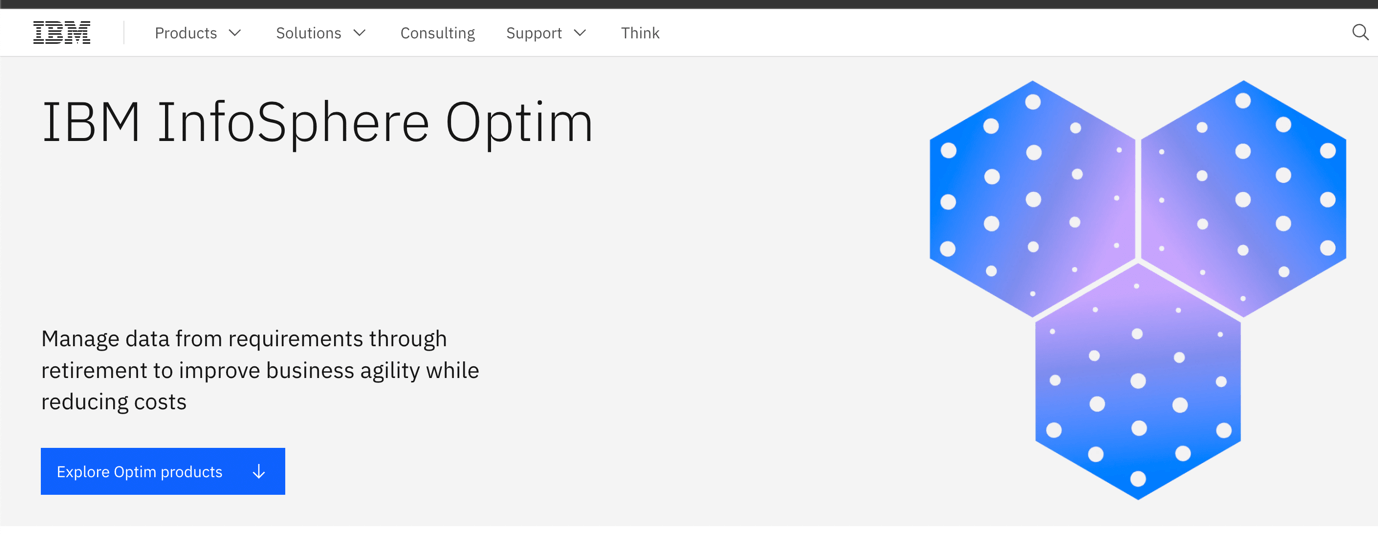
InfoSphere Optim, developed by IBM, offers a comprehensive suite of features, including data masking, subsetting, and synthetic data generation. These features ensure testing teams can access legally compliant, secure, and realistic test data tailored to their specific testing requirements.
It has established itself as one of the leading test data management tools, relied upon by businesses in various sectors to manage the issues associated with modern software testing while adhering to strict data privacy and regulatory standards. This is due to its resilient architecture, scalability, and seamless integration with widely recognized testing frameworks and development tools.
Key features of the IBM InfoSphere Optim test data management tool include.
- Comprehensive Data Masking and Subsetting: It provides robust data masking and subsetting capabilities that enable organizations to protect sensitive data and build realistic test scenarios. It retains testing accuracy while ensuring adherence to data privacy regulations.
- Automated Test Data Generation: It is an excellent test data management tool for automatically creating test data, accelerating the software testing lifecycle (STLC), and significantly reducing manual labor. This feature facilitates faster development cycles and enhances testing efficiency.
- Data Archiving and Purging: It is easier to archive and purge data effectively, which helps enterprises manage data growth and enhance database performance in general. This feature ensures that production databases remain optimized for performance and storage efficiency.
- Data Lifecycle Management: Its comprehensive features enable organizations to handle data efficiently from creation to retirement. This feature reduces storage costs and enhances data governance by ensuring data is retained appropriately.
- Test Environment Optimization: IBM InfoSphere Optim plays a key role in test environment optimization by delivering secure and realistic test data. It makes it feasible for companies to conduct extensive testing while preserving compliance and data privacy.
- Production Database Performance: It helps enterprises optimize their production databases, resulting in improved system performance, reduced storage costs, and more efficient data archiving and purging.
- Data Governance and Compliance: It ensures data governance and compliance is imperative for organizations, especially in industries with rigorous regulatory standards. It is pivotal in enabling organizations to uphold data governance and compliance through robust data lifecycle management capabilities. This functionality is particularly crucial for industries subject to stringent regulatory requirements.
 Note
NoteRun your tests on various browsers and operating systems by customizing your test environment. Try LambdaTest Today!
Informatica
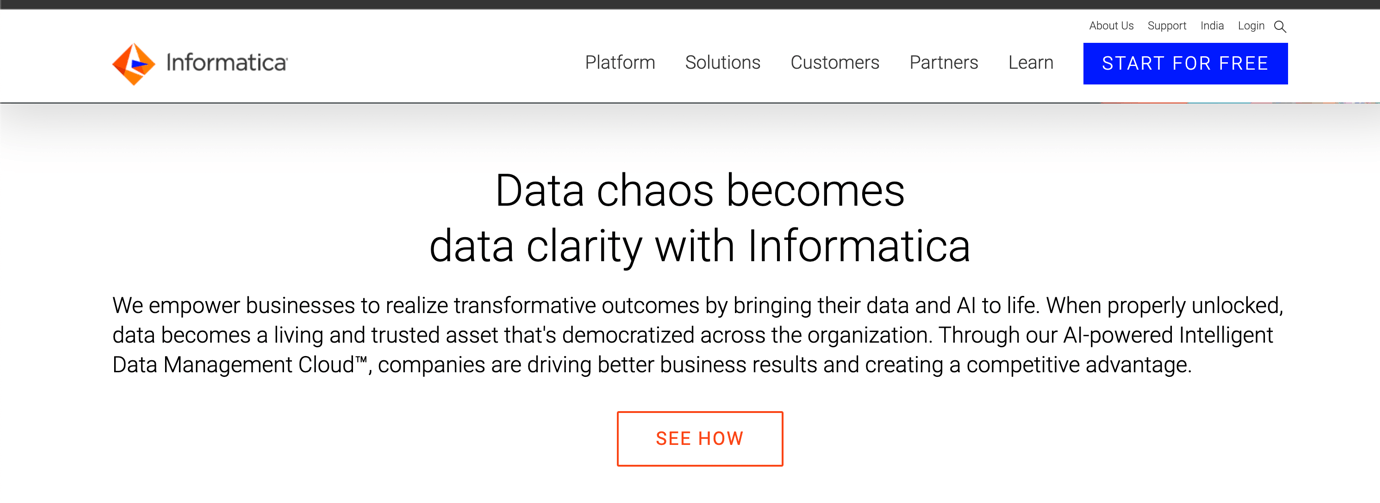
Informatica is one of the leading test data management tools, offering a comprehensive feature set to facilitate secure and effective test data management for enterprises of all sizes.
It is renowned for its comprehensive functionality and scalability, specifically designed to meet the demands of enterprises. Its test data management solution provides an integrated platform for managing diverse test data environments, seamlessly integrating with existing IT infrastructures.
Key features of the Informatica test data management tool include.
- Master Data Management (MDM): It enables businesses to set up and maintain one cohesive view of master data throughout the entire organization, reducing the risk of errors in decision-making processes by ensuring data accuracy and consistency.
- Advanced Data Quality Management: It puts a high priority on data quality with its sophisticated management capabilities. By using this test data management tool, organizations can establish and uphold data quality regulations, ensuring the reliability and precision of the data used for reporting and analysis.
- Cloud Data Management: It can easily leverage and manage data in cloud environments using Informatica’s cloud data management capabilities. For businesses using cloud technologies while searching for a scalable and adaptable data management solution, this feature is vital.
- Enterprise-wide Data Governance: It is instrumental in establishing robust data governance frameworks. Organizations may efficiently manage, track, and enforce data policies, ensuring accountability and compliance across the organization as a whole.
- Real-time Analytics: It can get real-time analytics using Informatica’s effective data integration and transformation solutions. This is especially beneficial for areas where timely insights are essential for making decisions.
GenRocket
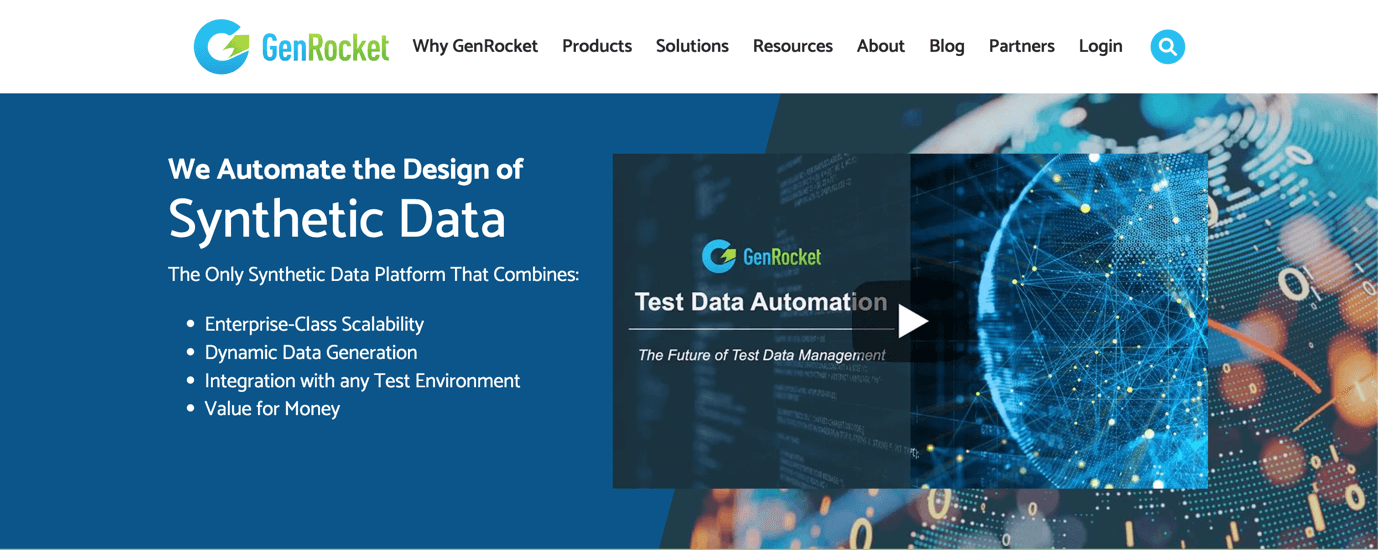
GenRocket is an emerging test data management tool with cutting-edge solutions that revolutionize the dynamics of test data management. Its advanced solution transforms how businesses create, handle, and provide test data by leveraging the capabilities of artificial intelligence and machine learning. With a range of features GenRocket provides, testers can quickly generate highly representative and realistic test data to meet their unique testing requirements.
Its complete test data lifecycle automation eliminates the time-consuming and error-prone manual processes involved in traditional test data management approaches. This acceleration of software delivery cycles enhances overall testing efficiency.
Key features of the GenRocket test data management tool include.
- Dynamic Test Data Creation: It dynamically generates test data, allowing organizations to create distinct and realistic datasets. By ensuring that testing scenarios closely replicate real-world settings, this dynamic approach improves the accuracy of the testing process.
- Scalable and Customizable Solutions: Its scalable design makes it easy for companies to adapt to evolving data requirements. With the tool’s customizable options, users may ensure data structure flexibility and customize test data production according to project-specific requirements.
- Real-time Data Replication: It can easily replicate data between different environments through its real-time data replication features. Ensuring data consistency throughout its entire lifespan, this feature makes a variety of testing and development scenarios easier to execute.
- Comprehensive Data Quality Assurance: It prioritizes data quality assurance, empowering organizations to define and implement stringent data quality rules. This commitment ensures that the generated test data is authentic and aligns with the utmost standards of precision and dependability.
- Agile Testing Environments: It is essential for developing Agile testing environments, enabling companies to produce high-quality software solutions and quickly adapt to changing project requirements.
- Database Upgrades and Migrations: It helps with database upgrades and migrations by offering realistic test data replicating the real-world configuration, ensuring a smooth transition with minimal disruptions.
- Compliance-Driven Testing: Its capacity to ensure compliance by creating test environments that abide by data privacy and security requirements is favorable to enterprises in highly regulated industries.
Delphix
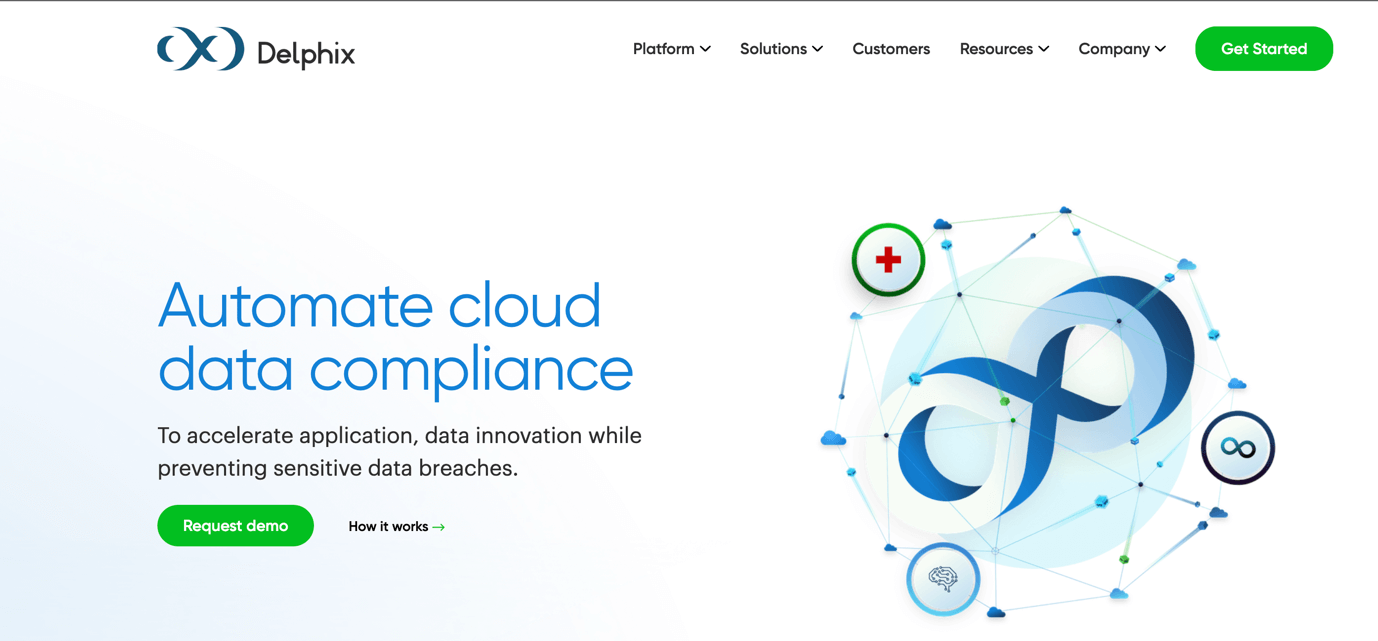
Delphix takes a multi-layered approach to data security, unlike typical test data management tools focusing solely on data masking. It goes beyond masking confidential data; it isolates production data from the testing environment by generating virtualized copies. With its extensive feature set, it not only accelerates testing processes but also ensures the integrity of sensitive data, addressing the high priority of security in today’s world.
Key features of the Delphix test data management tool include.
- Data virtualization: It enables organizations to quickly and easily generate virtual copies of their data as required. This ground-breaking capability accelerates test environment provisioning and significantly reduces storage requirements.
- Automated Data Delivery: It streamlines the process to ensure that the appropriate data is easily accessible when needed through automated data delivery. This expedites application development cycles and fosters collaboration among development and testing teams.
- Version Control for Data: It enables organizations to keep track of modifications and maintain an extensive data repository. This feature ensures that teams operate with accurate, up-to-date information and promotes effective data governance.
- Agile Development Environments: It becomes essential in environments where rapid iterations are the norm, supporting the agility needed for modern software development by enabling rapid and efficient testing cycles.
- Legacy System Modernization: It facilitates the testing and migration of data from legacy systems to modern platforms, enabling organizations to accelerate their digital transformation initiatives.
- Data Privacy and Compliance Testing: It is used by enterprises in highly scrutinized industries to ensure that test environments adhere to stringent security and privacy regulations through its data masking features.
CA Test Data Manager
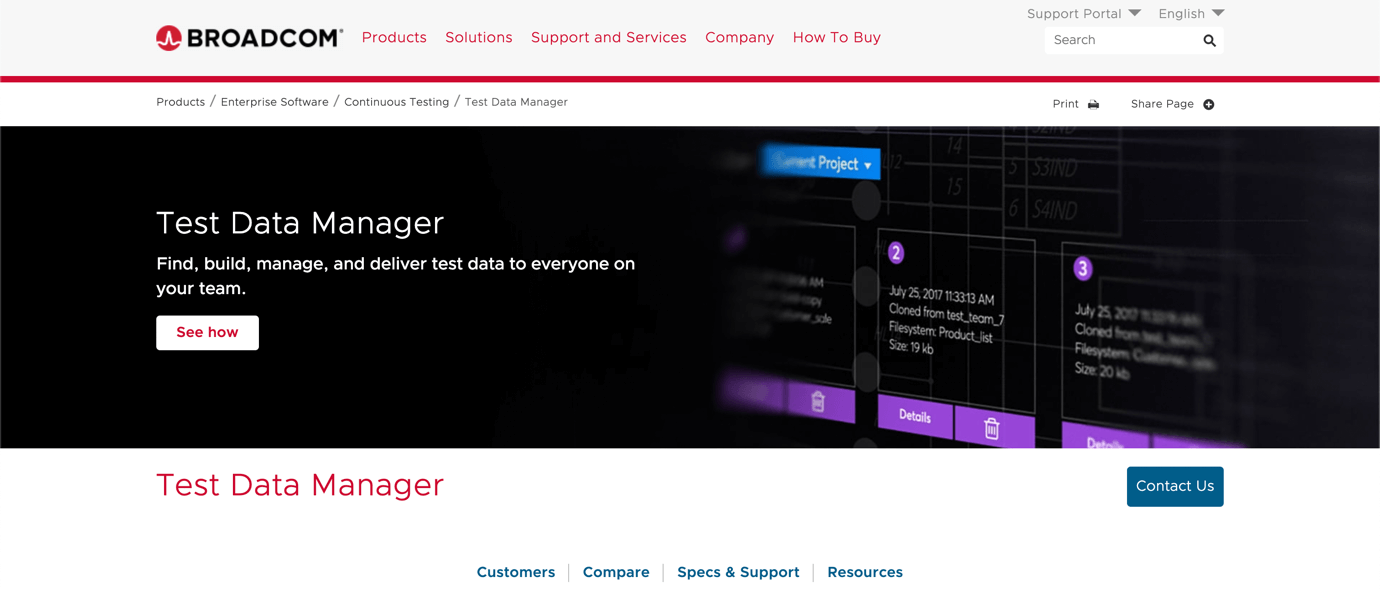
CA Test Data Manager, created by CA Technologies, is one of the leading global providers of modern software and solutions, enabling enterprises to effectively generate, manage, and supply safe and compliant test data at each phase of the software testing lifecycle.
With its extensive feature set, this potent test data management tool allows testers to generate highly representative and realistic test data customized to their specific testing requirements. From data masking and subsetting to synthetic data generation, it provides a robust set of features that ensure sensitive data remains protected while maintaining the integrity and usefulness of the test data.
Key features of the CA Test Data Manager test data management tool include.
- Data Masking: It prioritizes secure test data management through its robust data masking functionalities. This feature effectively cloaks sensitive information within test datasets, ensuring compliance with data privacy regulations and protecting confidential details. Users can leverage customizable masking rules for different data types, enabling granular control over the anonymization process.
- Subsetting and Transformation: It allows developers to focus their testing efforts on specific features or user scenarios by extracting pertinent subsets from huge data sets. This optimization expedites the testing process and minimizes storage requirements. The tool also makes data transformation easier, allowing existing data to be modified to produce more realistic test scenarios.
- Self-Service Provisioning: It can set up test data environments using CA TDM’s self-service provisioning approach. It improves the overall agility and efficiency of testing by reducing the dependency on IT teams for data provisioning tasks.
- Integration with Development Tools: A unified development and testing ecosystem is made feasible by CA TDM’s seamless integration with various testing frameworks and development tools. This streamlined approach enables data exchange and promotes efficient test data management within the existing development environment.
- Legacy System Modernization: It supports the testing and migration of data from legacy systems to contemporary platforms. This capability empowers organizations to expedite their digital transformation journey.
- Data-Intensive Applications: It ensures effective and secure test data management for applications that rely on large and complex datasets, including those in the financial services, healthcare, and telecommunications sectors.
Solix Enterprise Data Management Suite (EDMS)
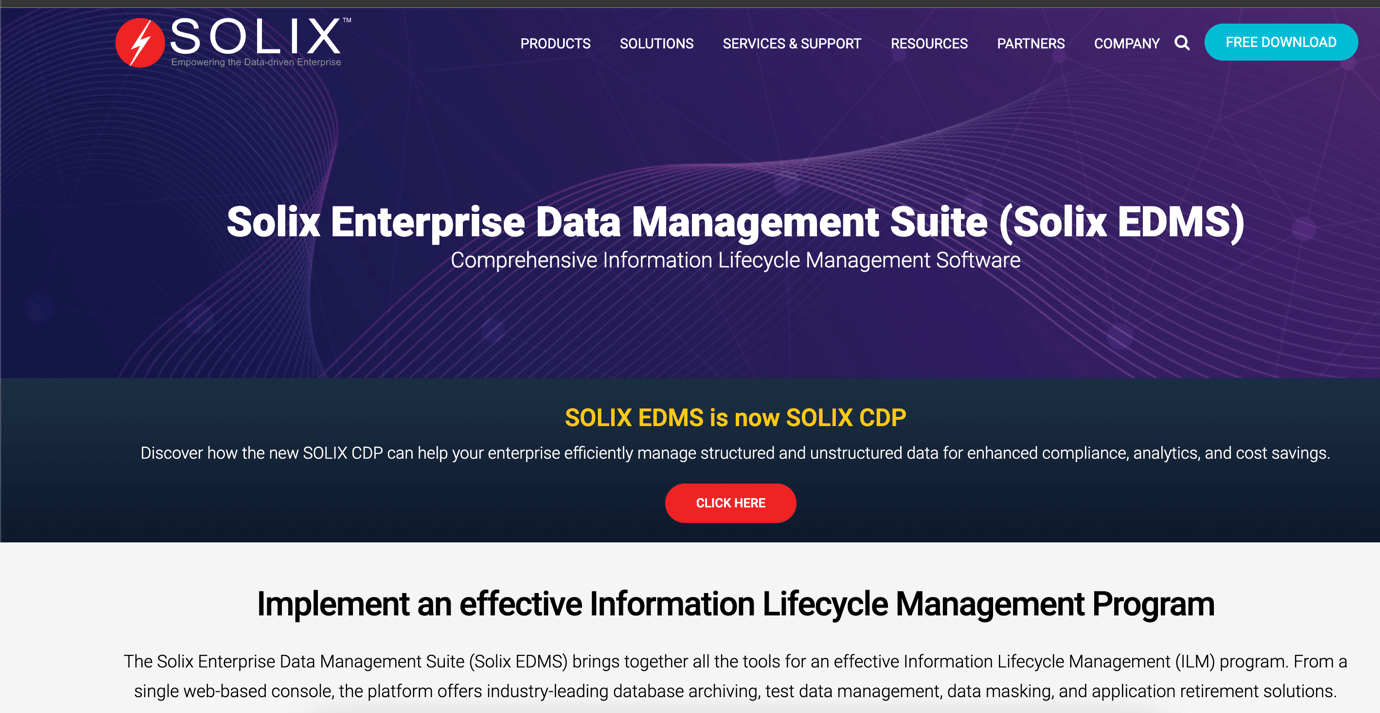
Solix Enterprise Data Management Suite (Solix EDMS) has gained recognition as a test data management tool for its impressive feature set, enhancing data security and compliance while streamlining testing cycles. EDMS offers a comprehensive suite of capabilities that allow organizations to efficiently generate, manage, and provision high-quality test data, speeding up software delivery cycles and maintaining a competitive edge.
Key features of the Solix EDMS test data management tool include.
- Data Masking and Anonymization: It offers powerful data masking and anonymization features to ensure sensitive data stays confidential and conforms with regulatory requirements like GDPR, HIPAA, and PCI-DSS, reducing the risk of data breaches and associated legal ramifications.
- Synthetic Data Generation: Its synthetic data generation features further improve data privacy and security by allowing testers to generate highly representative and realistic test data without using sensitive production data.
- Data Management and Retention: It provides comprehensive data archiving and retention functionalities that facilitate the administration and maintenance of test data for audits or future reference while ensuring compliance with regulatory standards.
- Self-Service Data Access: Its self-service portal empowers development and testing teams to access the data they need when they need it, streamlining collaboration and reducing bottlenecks.
- Integration with DevOps Tools: It integrates with known DevOps monitoring tools and CI/CD tools like Jenkins, Ansible, and more.
- Environments for Agile Development: Its Agile development environments benefit significantly from Solix EDMS TDM’s ability to promote continuous testing and rapid iterations.
- Compliance-Based Testing: It is used by organizations in highly regulated sectors for compliance-driven testing, creating test environments that comply with strict security and privacy regulations.
Original Software Qualify
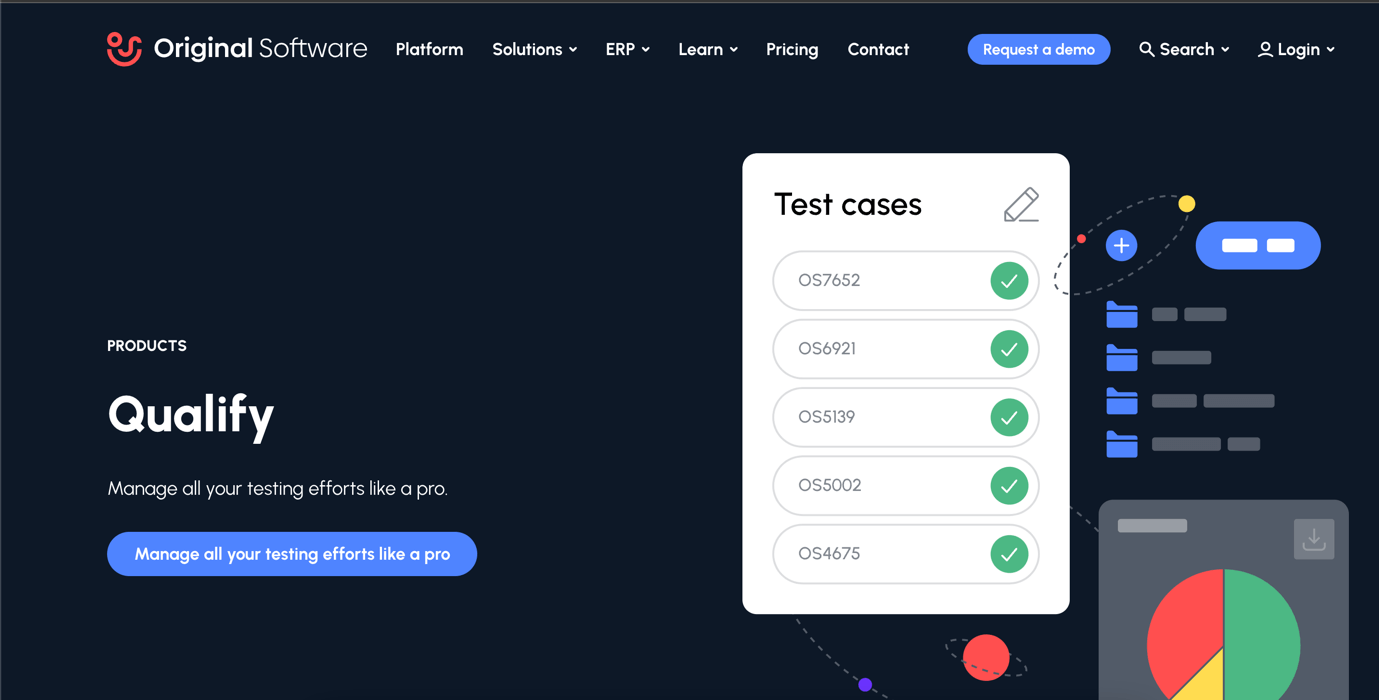
Original Software Qualify is recognized as one of the leading test data management tools, offering comprehensive features that enhance data integrity and optimize testing cycles. It remains a critical tool for achieving improved data integrity and testing excellence as long as companies prioritize efficiency and security in their testing efforts.
Key features of the Original Software Qualify test data management tool include.
- Centralized Test Case Management: It provides a centralized platform for creating, storing, and managing test cases, fostering collaboration between testers and facilitating the organization of testing efforts.
- Automated Test Script Execution: It simplifies the execution of tests by facilitating the creation and execution of automated test scripts, making testing more efficient and consistent across test runs.
- Integration with Development Tools: It seamlessly integrates with various development tools and frameworks, creating a unified development and testing ecosystem and promoting better communication and collaboration throughout the software development life cycle (SDLC).
- Comprehensive Analytics and Reporting: It offers comprehensive analytics and reporting functionalities, allowing users to generate detailed reports on test results, identify bugs and defects, and track overall testing progress.
- Applications Relying on Large and Complex Datasets: It offers effective and secure test data management for applications relying on large and complex datasets, such as those in the financial services, healthcare, and telecommunications industries.
- Compliance and Regulations: It provides powerful data masking and anonymization tools for businesses in highly scrutinized sectors, such as healthcare, finance, and government, to comply with data privacy and security regulations.
Redgate SQL Data Generator
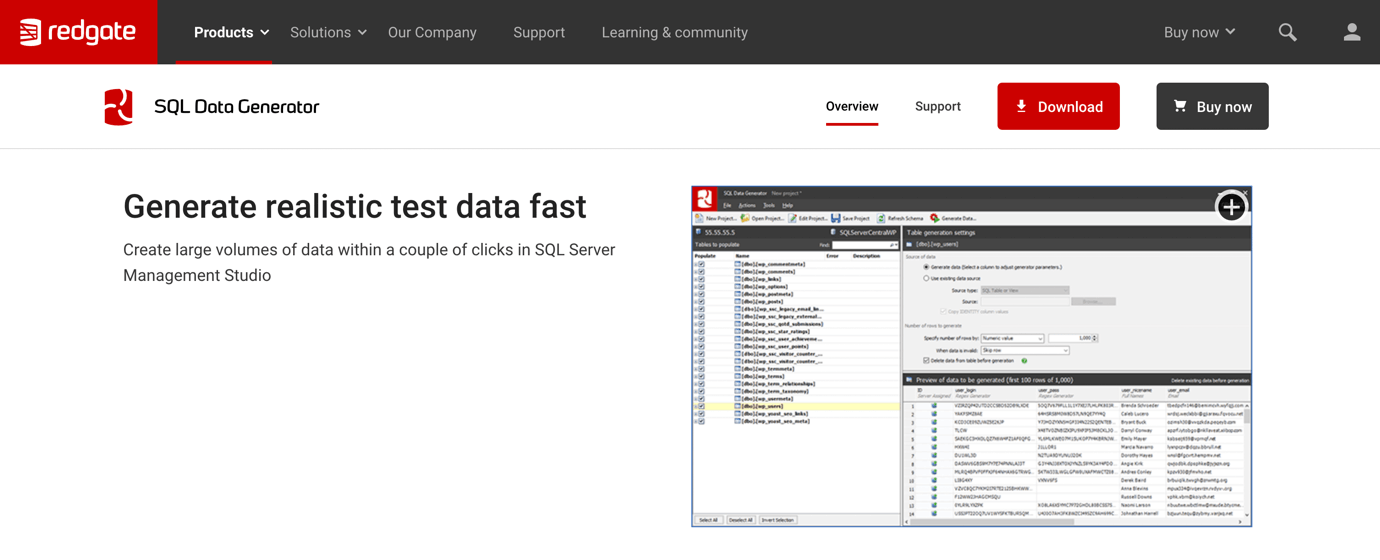
Redgate SQL Data Generator is one of the leading test data management tools that offers a comprehensive approach to test data generation and management challenges. This tool is designed to meet the diverse needs of modern software testing environments, focusing on improving testing processes. It empowers development and testing teams to create accurate and realistic testing scenarios and easily navigate the complexities of test data generation.
The user-friendly design of Redgate SQL Data Generator is designed for the complex requirements of modern testing environments, making it highly effective. Its extensive feature set simplifies the often challenging tasks of creating, organizing, and using test data. The flexibility of this tool allows it to be easily integrated into existing workflows, making it an essential part of the testing process.
Key features of the Redgate SQL Data Generator test data management tool include.
- Effortless Test Data Generation: It automates creating diverse and realistic test datasets, significantly reducing the manual effort required for test data preparation.
- Versatile Data Profiles: It offers versatile data profiles that enable users to define specific characteristics and constraints for generated data, ensuring relevance to real-world scenarios.
- Relationships and Referential Integrity: It maintains referential integrity in the generated datasets, reflecting real-world database relationships and ensuring the accuracy of testing scenarios.
- Data Masking for Privacy: It recognizes the importance of data privacy by incorporating features for data masking, allowing users to obfuscate sensitive information to comply with privacy regulations.
- Integration with SQL Server: It integrates with Microsoft SQL Server and ensures a cohesive experience for users already leveraging SQL Server for their databases.
- Database Unit Testing: It plays a pivotal role in database unit testing by providing realistic and diverse datasets for thoroughly testing database functionalities.
- Data Warehousing: It facilitates the population of data warehouses with meaningful test data for thorough validation of ETL processes and reporting.
Ekobit TD/OMS (Test Data and Order Management System)

Ekobit is a leading innovative software development, quality assurance, and digital transformation solutions provider. Their test data management tool addresses the challenges of managing test data in complex IT environments.
With a strong emphasis on efficiency and compliance, this test data management tool enables organizations to optimize their testing workflows by providing realistic test data and protecting sensitive information. This is done through advanced data masking techniques, which facilitate test data provisioning to various testing environments. This ultimately leads to improved testing efficiency, reduced time-to-market for applications, and enhanced compliance with data privacy regulations.
Key features of the Ekobit test data management tool include.
- Subsetting and Data Masking: It enables organizations to protect sensitive data by concealing or anonymizing significant data. Data subsetting is supported by the platform, which makes it possible to create simpler, more representative subsets of production data for testing.
- Security and Compliance with Data: It emphasizes data compliance, supporting organizations in complying with safety standards and privacy regulations. The tool ensures that sensitive information is handled securely throughout the test data lifecycle.
- Integration Capabilities: It seamlessly integrates with various testing tools, databases, and environments, providing a cohesive solution for test data management within existing workflows.
- Data Virtualization: It supports data virtualization, allowing teams to create virtual copies of databases without physical copies and optimizing resource utilization.
- Software Testing and Quality Assurance: It is instrumental in software testing, ensuring testing teams can access the right test data to validate application functionality and performance.
- Data Privacy and Compliance Testing: Organizations use Ekobit for compliance testing to ensure that applications handle sensitive data under regulatory requirements.
- DevOps and Continuous Testing: It supports DevOps practices by providing a continuous and automated approach to test data management, aligning with Agile development methodologies.
To learn more about improving the efficiency of software applications in DevOps, it’s essential to understand DevOps automation and the use of various DevOps testing tools. These tools automate processes and enhance testing strategies, ultimately helping organizations improve their DevOps practices.
Tricentis Tosca
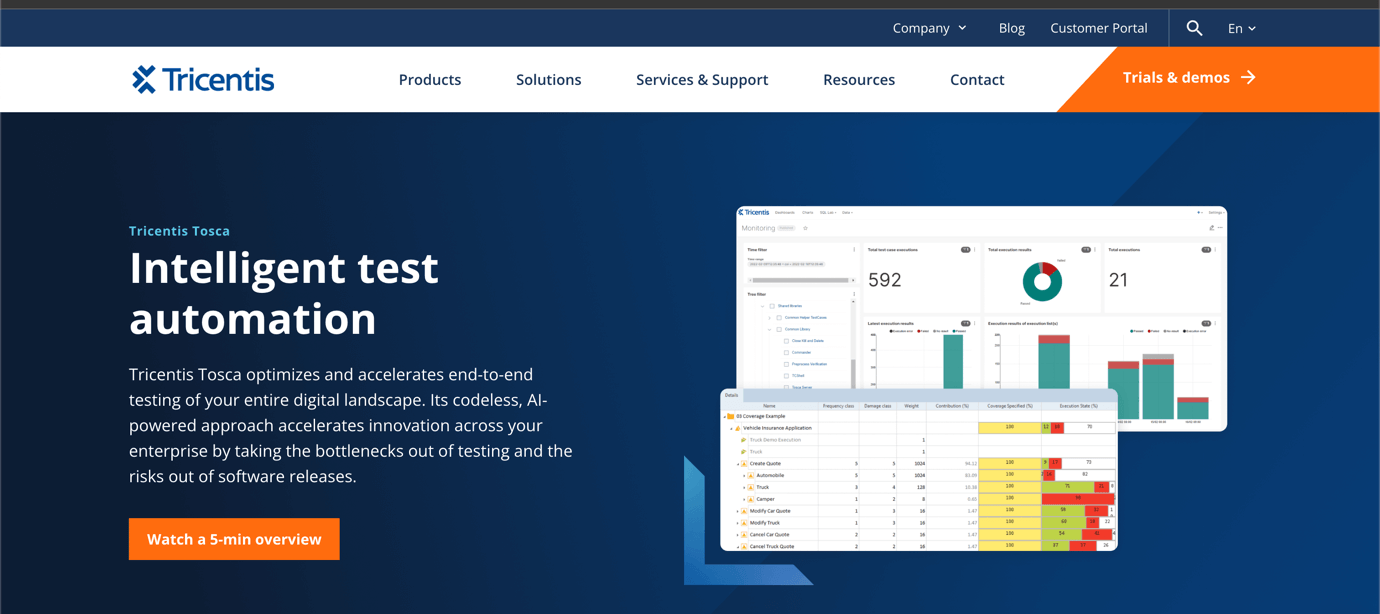
Tricentis Tosca is an efficient test data management tool. In software testing, effective and secure test data management is crucial. It emerges as a groundbreaking solution, providing a comprehensive set of features meticulously crafted to ensure compliance with privacy regulations, expedite provisioning processes, and enhance the reuse of test data across various testing scenarios.
The extensive features of Tricentis Tosca underscore Tricentis’ commitment to providing organizations with innovative solutions that streamline their testing processes.
Key features of the Tricentis Tosca test data management tool include.
- Automated Test Data Generation: It automates data generation capabilities to streamline the process of creating realistic and diverse test datasets, reducing manual efforts and accelerating testing cycles.
- Dynamic Data Masking: It offers dynamic data masking features, allowing users to anonymize sensitive information while ensuring compliance with data privacy regulations.
- Integration with Test Automation: It seamlessly integrates with test automation frameworks, providing a unified platform for test case design, execution, and data management.
- Data Virtualization: It supports data virtualization, enabling the creation of virtual copies of databases for efficient testing without the need for physical duplicates.
- Agile and DevOps Environments: It seamlessly aligns with Agile and DevOps methodologies, supporting rapid iterations and continuous testing practices.
- Cross-Browser and Cross-Platform Testing: It facilitates testing across various browsers and platforms, ensuring consistent functionality and performance.
- HIPAA Compliant: It maintains the confidentiality of data during testing, complying with strict regulatory requirements such as the Health Insurance Portability and Accountability Act (HIPAA).
QuerySurge
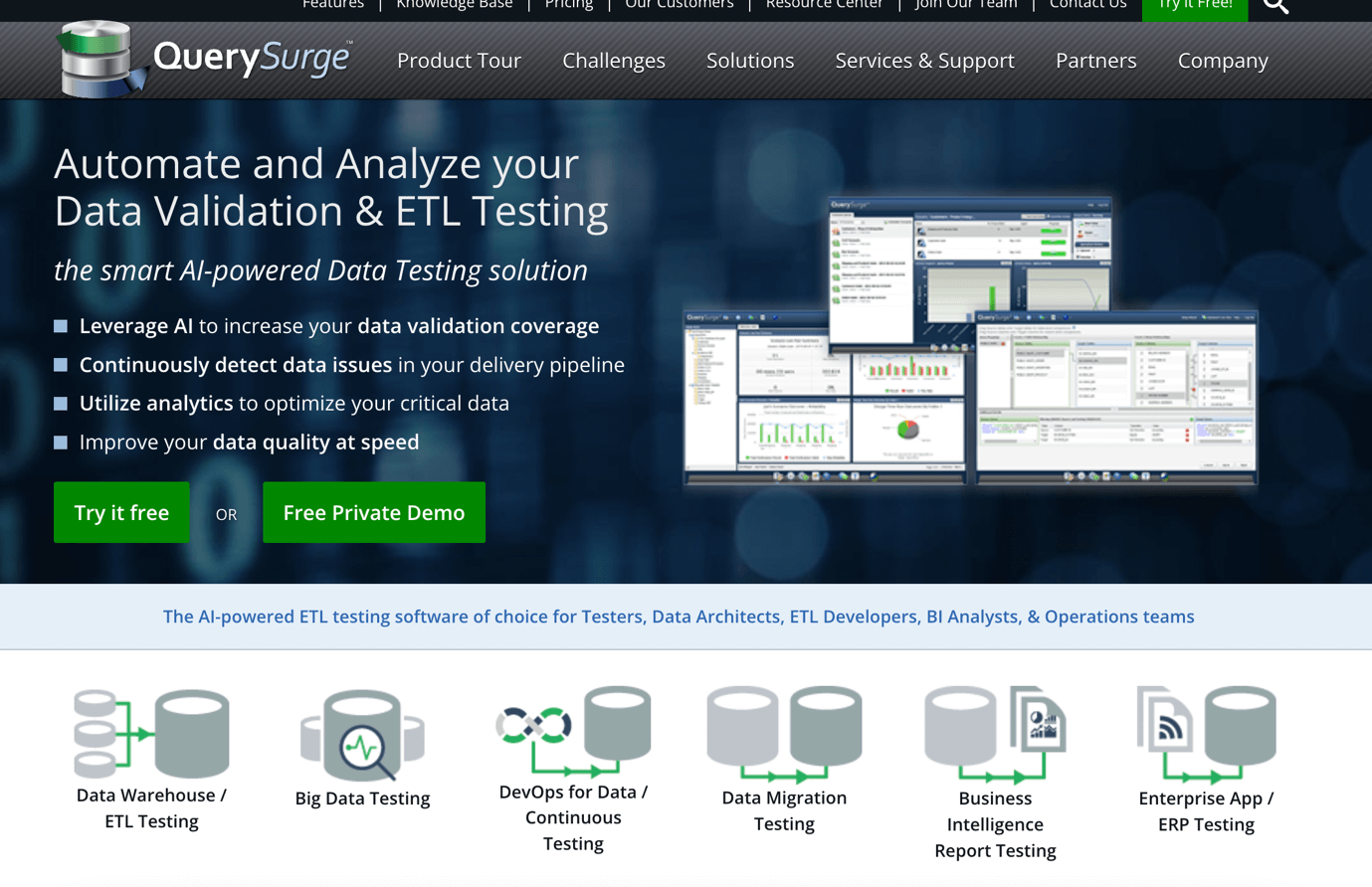
QuerySurge is a “smart data testing solution” that automates data validation and testing for various data ecosystems. Its robust features and user-friendly interface make it an efficient test data management tool, empowering organizations to streamline their testing workflows and achieve unparalleled precision in their testing endeavors.
It excels as a test data management solution designed for data-driven testing scenarios. It is an AI-powered validation and self-service equipping feature that can significantly streamline data management within data warehouses, big data environments, and BI reporting workflows.
Key features of the QuerySurge test data management tool include.
- Data Masking and Anonymization: It masks sensitive information within test data sets to ensure data privacy compliance.
- Data Subsetting: It extracts specific data subsets relevant to targeted testing scenarios, optimizing storage utilization and reducing test execution time.
- Self-Service Data Provisioning: It allows testers to request and provision masked test data sets on-demand, fostering test automation and reducing reliance on data management teams.
- Integration with Development and Testing Tools: Integrates with various development and testing tools, allowing for a cohesive testing workflow.
- Continuous Testing Support: It facilitates continuous testing practices by enabling automated data validation within CI/CD pipelines.
- Data Warehouse Testing: It is ideal for testing data warehouses and ETL processes, allowing users to validate data transformations and ensure the accuracy of data migration processes.
- BI Report Testing: It enables organizations to validate the accuracy of Business Intelligence (BI) reports by comparing data extracted from different sources and verifying that reports reflect the expected results.
TechArcis
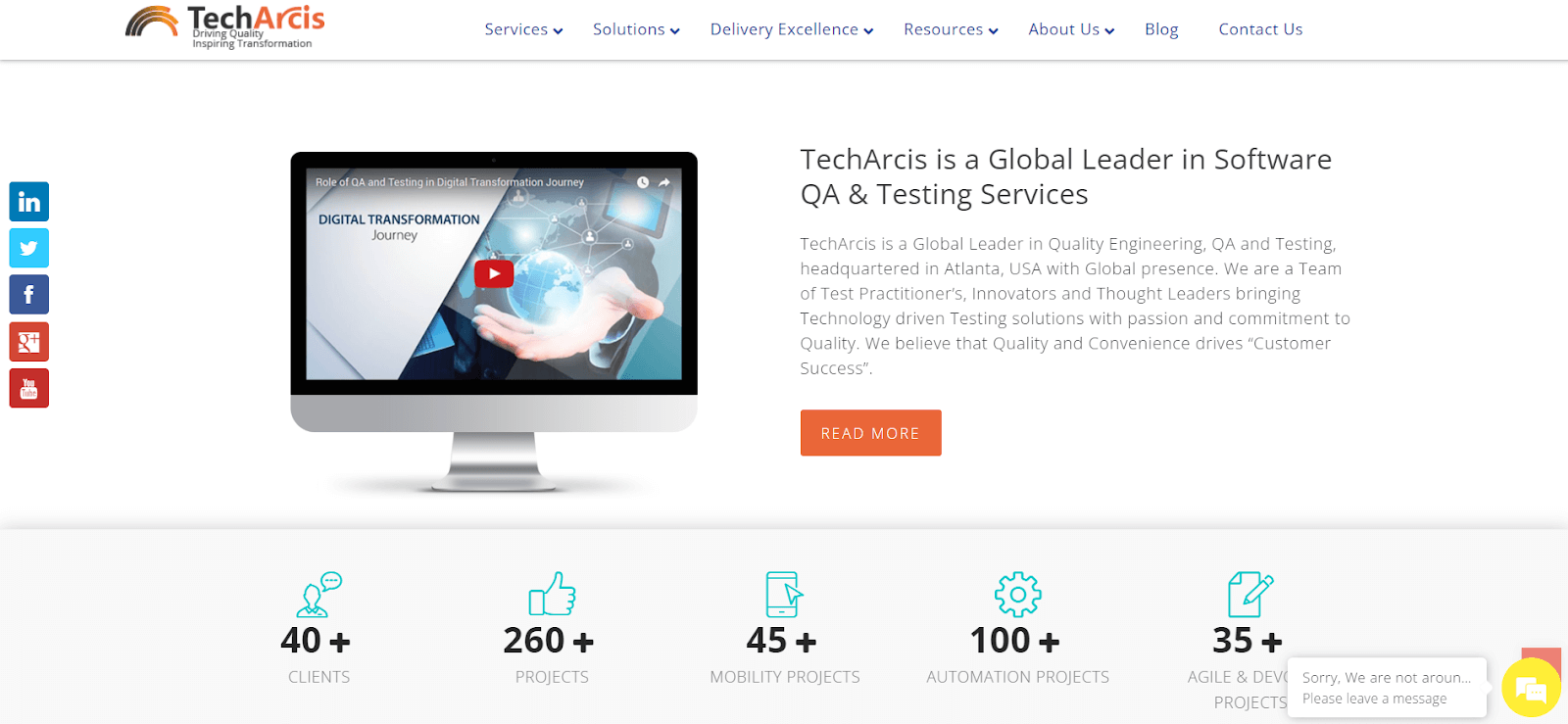
TechArcis offers a user-friendly and efficient test data management tool that automates the creation of complete, accurate, and secure test data. This tool provides a customized approach to test data management, offering flexibility in testing environments and ensuring that the entire test data delivery process is regularly updated.
Reusing baseline test data and data selection criteria accelerates the delivery process. The tool also enhances data security through masking while maintaining referential integrity. Additionally, it generates reports that mimic real production data, allowing for systematic evaluation of system behavior.
Key features of the TechArcis test data management tool include.
- Test Data Creation: It automates the creation of test data, ensuring that it is complete, accurate, and secure.
- Test Data Management: It provides flexibility in managing test data, allowing customized approaches to meet specific testing requirements.
- Test Data Baseline: It reuses baseline test data and data selection criteria; TechArcis speeds up the delivery process and improves efficiency.
- Data Masking: It includes data masking capabilities to increase test data security while maintaining referential integrity.
- Test Report Generation: It generates reports that closely mimic real production data, allowing for systematic evaluation of system behavior.
vTestcenter
The vTestcenter test data management tool is a scalable data testing solution that ensures data consistency and reusability while generating powerful test reports. It is designed to accommodate teams of all sizes, from small teams to large workgroups. It provides full traceability, from testing specifications to implementation, execution, and reporting.
The tool’s open interface allows for easy integration with existing test tools. Its convenient cockpit function enables quick access and management of relevant data. Additionally, it provides a multi-user platform that allows testers and developers to easily integrate various data types, such as test scripts, models, and test results.
Key features of the vTestcenter test data management tool include.
- Scalability: It suits all team sizes, from small to large workgroups.
- Data Consistency: It ensures that data is consistent and can be reused across various test scenarios.
- Test Reporting: It generates comprehensive and powerful test reports for analysis and decision-making.
- Full Traceability: It traces testing specifications to implementation, execution, and reporting.
- Data Integration: It facilitates the integration of various data types, such as test scripts, models, and test results.
- Integration: It offers seamless integration with automation testing tools and environments.
As we have learned about all the various test data management tools and their key features, in the section below, we will learn about the criteria to look for when selecting the right test data management tool.
Choosing The Right Test Data Management Tool
Selecting the right test data management tool ensures a seamless and effective testing process. With numerous options available in the market, each offering unique features and capabilities, conducting an in-depth analysis is crucial. Organizations must carefully evaluate all options before choosing the right tool by carefully weighing the below-mentioned factors and making informed decisions by selecting the right test data management tool that best fits their project needs.
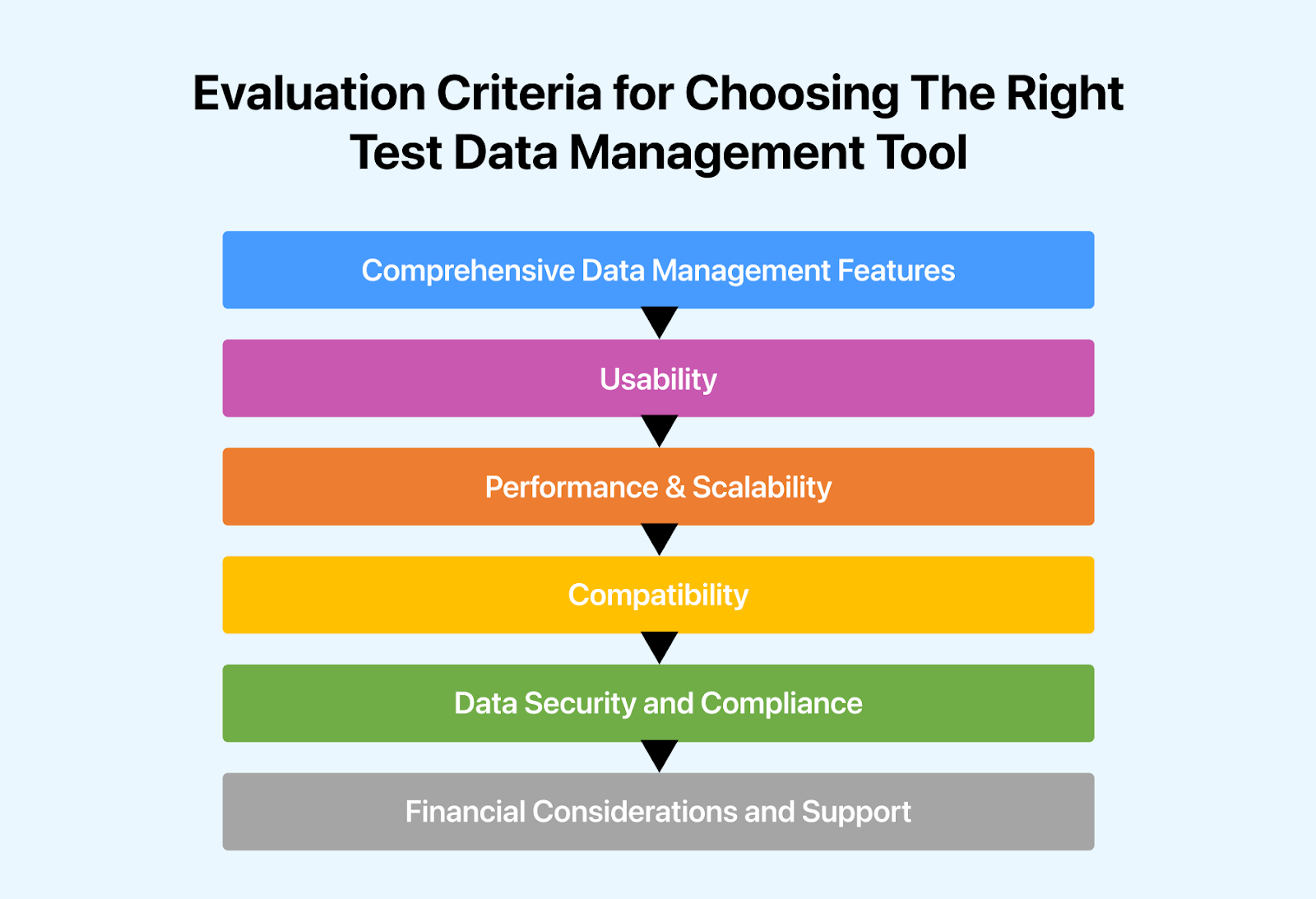
- Comprehensive Data Management Features
- Data Generation and Synthetic Data: It is important to evaluate the tool’s capability to generate realistic and varying datasets, as well as its ability to create synthetic data in scenarios where obtaining real data is challenging.
- Quality Analysis and Data Profiling: It is crucial to consider the aspects of the tool that support accurate testing in data profiling, such as the analysis of relationships, structure, and content of datasets.
- Data Archiving and Storage Optimization: It is necessary to assess the tool’s ability to archive older or less relevant data and optimize storage.
- Usability
In this stage, when selecting the right test data management tool, it’s important to prioritize and check if the tool offers usability features.
Below are some criteria to evaluate usability.
- User Interface (UI): It is important to consider technical and non-technical users when reviewing the UI’s intuitiveness and ease of use.
- Learning Curve: It is essential to evaluate the team’s access to training and support resources to ensure an easy transition and efficient team adoption.
- Options For Customization: It is crucial to assess the level of flexibility the tool provides to customize user roles, data rules, and workflows.
- Performance & Scalability
- Data Volume Handling: It is important to analyze the tool’s capacity to handle your current and projected data volumes without compromising stability or performance.
- Scalability To Support Potential Expansion: It is crucial to consider the tool’s scalability in the context of growing data complexity and testing requirements.
- Compatibility
- Compatibility With Existing Testing Tools: It is important to ensure that the tool collaborates seamlessly with your existing CI/CD pipelines and automation testing frameworks for streamlined testing workflow.
- API Accessibility: It is crucial to evaluate the existence and functionality of APIs for programmatic access and integration with other systems.
- Data Security and Compliance
- Data Security Features: Evaluate the tool’s measures for audits, access control, and data encryption to protect sensitive data effectively.
- Regulatory Compliance: Ensure that the selected tool aligns with pertinent data privacy regulations, such as the CCPA or GDPR, if applicable.
- Financial Considerations and Support
- Licensing Costs: It is important to analyze the terms and conditions of various tools to select one that aligns with user requirements and financial considerations.
- Customer Support: It is crucial to assess the vendor’s customer service level and responsiveness to technical inquiries or troubleshooting needs.
In this stage, when selecting the right test data management tool, it is important to check if the tool provides synthetic data generation, optimizes storage, and supports accurate testing in data profiling, among other things.
Below are some criteria to evaluate.
In this stage, when selecting the right test data management tool, it is important to check if the tool provides good performance and if it can scale up as needed.
Below are some criteria to evaluate performance and scalability.
In this stage, when selecting the right test data management tool, you must check if the tool is compatible with various devices and browsers.
Below are some criteria to evaluate compatibility.
In this stage, when selecting the right test data management tool, you must check if the tool provides data security and complies with data privacy regulations to prevent data leaks and manage test data effectively.
Below are some criteria to evaluate the data security and compliance.
In this stage, when selecting the right test data management tool, you must check if the tool is budget-friendly for businesses to opt for and if it has a supportive community to help when faced with any issues while using the tool.
Below are some criteria to evaluate financial consideration and support.
Based on the criteria mentioned above, you can carefully assess test data management tools when selecting the one that best suits your specific testing environment, technical specifications, and budgetary constraints.
In the below section, we will learn more about the different test management tools that can optimize and enhance your testing process. We will also understand how these tools help deliver software that meets business/user expectations.
Conclusion
Test data management tools are constantly evolving, providing organizations with diverse solutions tailored to their testing requirements. From comprehensive data generation and masking capabilities to seamless integration with test automation frameworks, these top TDM tools are pillars of efficiency and accuracy in software testing.
By empowering organizations to navigate the intricacies of test data with finesse and reliability, these tools facilitate enhanced quality assurance practices, ultimately contributing to the delivery of robust and dependable software solutions. Embracing effective test data management ensures the integrity of testing processes and enhances the overall software development lifecycle.
Frequently Asked Questions (FAQs)
What are the 4 types of testing data?
The four types of testing data are real production data, artificially generated data, masked data, and data specifically created for testing scenarios.
What is the use of test data?
Test data is used to verify that software functions correctly under various conditions. It helps ensure that the software behaves as expected in different scenarios.
Can a test data management tool automatically generate synthetic test data to simulate real-world scenarios?
Yes, test data management tools can automatically generate synthetic test data and provide realistic scenarios for testing without exposing real data.
What methods do test data management tools use to ensure data consistency and integrity across different testing environments?
It maintains data consistency and integrity by using baseline test data and data selection criteria, ensuring test environments accurately reflect production data.
Got Questions? Drop them on LambdaTest Community. Visit now













